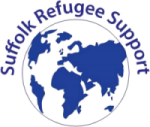Background
We are a charity and a company limited by guarantee, established in 1999 by concerned local people who realised that numbers of asylum seekers and refugees were arriving in Suffolk, particularly in the Ipswich area, and that there was a need for advice, advocacy and practical support. We have developed our services over the years in response to the needs of our clients (see What We Do page for more details). We are an independent charity whose purpose is to ensure that all asylum seekers and refugees in Suffolk are enabled to live integrated, fulfilled and contributing lives in their new communities.
Who are Refugees and Asylum Seekers?
A refugee is someone who has been forced to leave their country in order to escape war or persecution. Their own government is unwilling or unable to protect them and they are unable to return home until conditions are safe for them again.
The 1951 Refugee Convention defined a refugee as someone who has a well-founded fear of persecution for reasons of race, religion, nationality, political opinion or membership in a particular social group.
In the UK a person granted refugee status is normally given five years leave and then they can apply for indefinite leave to remain.
An asylum seeker is someone in the process of claiming protection in another country. Once an asylum claim is recognised by a host country then they can live in their host country as a refugee.
Everyone has the right to seek asylum – it is recognised as a universal human right.
Asylum seekers are not required to claim asylum in the first safe country they reach.
There are no safe, legal routes for people to reach the UK for the purposes of claiming asylum.
International situation (as of September 2025)
- 123.2 million people worldwide were forcibly displaced at the end of 2024 as a result of persecution, conflict, violence and human rights violations
- Forced displacement globally has nearly doubled over the last decade
- 1 in every 67 people on Earth is forcibly displaced
- More than one third of all forcibly displaced people globally are Sudanese (14.3 million), Syrian (13.5 million), Afghan (10.3 million) or Ukrainian (8.8 million)
- Children account for 29% of the world’s population, but 40% of forcibly displaced people
- There are 42.7 million refugees globally (i.e. outside the borders of their own country)
- 67% of refugees live in countries neighbouring their own
- 73% of refugees are hosted in low and middle income countries
- 149 countries have agreed to protect refugees under the 1951 Refugee Convention; the UK was one of the first group of 28 countries to sign the Convention in 1951
UK situation
- Refugees make up approximately 0.75% of the UK’s population
- 7,815 refugees were resettled in the UK in 2024, 91% under Afghan programmes
- Around 227,000 people have come to the UK under Ukraine refugee schemes, less than 4% of the 6 million Ukrainian refugees recorded in European countries as of July 2024
- In 2024 there were 84,231 asylum applications in the UK (relating to 108,138 people)
- By comparison, in 2024 Germany had 235,925 asylum applications, Spain 165,398, France 158,512 and Italy 154,824
- The UK ranks 17th in Europe (EU+) in terms of asylum applications per head of capita
- 36,816 people crossed the Channel in small boats in 2024
- In the year to June 2025, the top 5 nationalities for small boat arrivals were Afghanistan, Eritrea, Iran, Syria and Sudan – all countries suffering horrific conflict or oppression
- Between 2018 and 2024, 68% of all initial decisions on asylum applications from people who arrived by small boat were grants of protection, with more successful on appeal
- Asylum seekers are generally not allowed to work in the UK. Those living in hotels receive £9.95 per week, and those in ‘dispersal’ accommodation £49.18 per week.
Local Situation
Suffolk is home to settled refugee communities, many of them established over the past 25 years with the majority living in Ipswich. For historical reasons, the largest community is Kurdish. Many of these people have British citizenship, refugee status or leave to remain in the UK.
There are also asylum seekers, predominantly in family groups, housed across Suffolk under the government’s ‘dispersal’ system. These people come from a range of countries and all are awaiting a decision on their asylum claim. In addition, over recent years Suffolk has hosted an increased number of Unaccompanied Asylum-Seeking Children (UASCs).
Suffolk is also taking part in the government’s refugee resettlement schemes- the UK Resettlement Scheme (UKRS) and the Afghan Resettlement Programme (ARP). Suffolk Refugee Support is contracted to provide specialist casework for families and individuals arriving in Suffolk under both resettlement programmes as well as providing practical support and advice to Ukrainian refugees arriving in Suffolk under both the Ukraine Family Scheme and Homes for Ukraine scheme.
Suffolk overview (as of September 2025):
An estimated 2500-3000 settled refugees – with the largest community being Kurdish
Approximately 1100 Ukrainian refugees under the Homes for Ukraine scheme (plus those here under the Ukraine Family Scheme)
Around 300 UASCs (unaccompanied asylum seeking children) and care leavers
Approximately 130 people in asylum ‘dispersal’ accommodation, mostly families and mainly in Ipswich, but with growing numbers elsewhere in the county
There is no asylum contingency accommodation currently in Suffolk – i.e. no hotels
Around 300 refugees here under UK government resettlement schemes – predominantly Syrian and Afghan and almost all in family groups
